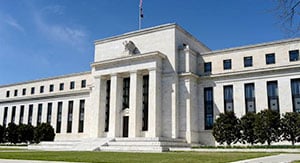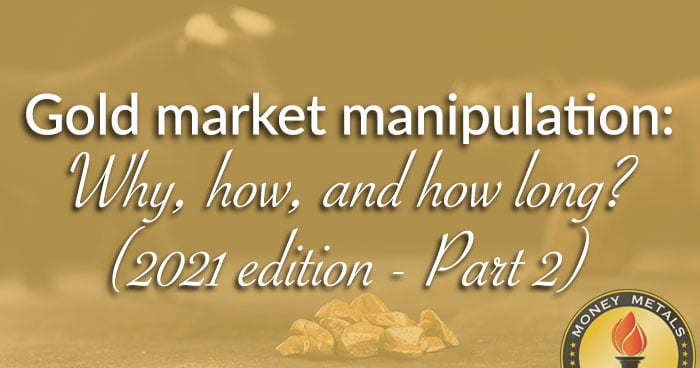The many documents we reviewed Monday establish the gold price suppression policy of Western governments, as well as its long duration. But even people unaware of those documents might easily come to suspect this policy on their own.
Consider the telling action of the gold market itself
The gold price is often smashed out of the blue in the futures markets when there is no news relevant to gold particularly or the currency markets generally. There are often waves of selling in gold futures by some entity that seems not to care about obtaining the best price for the metal it purports to be selling.
An ordinary seller staggers his sales, selling a little at a time, to avoid depressing the market price along the way. If you dump a lot of your assets on the market all at once, you crash the price.
But careful, profit-maximizing selling of an asset is often not what happens with gold. Some entity frequently bombs the market, dumping huge amounts of futures contracts all at once, precisely to knock the price down. This is an entity that profits not from a rising price of gold but from a falling price, and an entity that seems to have access to infinite money.
Such attacks are almost certainly government interventions, likely conducted through the Bank for International Settlements and brokers representing government agencies. They knock the gold price down to keep government currencies and bonds up.
There is also much counterintuitive action with the gold price. It often reacts the opposite of what you would expect. When there is some financial disaster or geopolitical crisis, gold often falls instead of rises. This likely is also the result of government intervention.
Consider the refusal of governments and central banks to explain.
Anyone who doubts Western gold price suppression policy can erase his doubt just by trying to put a question or two to Western governments and central banks, as GATA long has done.
Are central banks secretly involved in the gold market? Are they trading directly or through intermediaries like the BIS or investment banks? If so, what is the objective of this trading? Are they trying to manipulate currency values? Just what are they doing, for whom, and why?

Why are Central Bank Board of Directors meetings and deliberations secret if not to prevent the public and the markets from learning about secret interventions by the government?
Exactly what is government policy toward gold? Is there any policy, or is the government completely indifferent to the monetary metal?
If you put such questions to a central bank and ever get any response, please let me know.
If, as is more likely, you get no response, or an evasive one, at least you'll have confirmed that a central bank doesn't want you to know what it's doing – doesn't want its people to know what it's doing.
Consider the failure of mainstream financial news organizations.
While mainstream financial news organizations occasionally report about gold, their reporting is always superficial. If you follow that reporting for long, you will see that the first rule of mainstream financial journalism about gold is: Never put to a central bank a critical question about gold, or any question about gold.
Indeed, for some time I have thought that the greatest power of Western central banking is not its power to create and deploy infinite money but rather its ability to intimidate financial news organizations – or the innate cowardice of those organizations.
For the gold price suppression scheme cannot work without deception, surreptitiousness, and misunderstanding. If mainstream financial news organizations ever exposed the scheme, investors would not participate in the markets that were being rigged, like the gold futures market. In that case, investors who wanted gold would purchase only real metal and remove it from the banking system. They would not purchase gold futures or gold supposedly held in trust for them by investment banks.
Why are financial news organizations so negligent about gold?
Partly it is because central banks and governments generally are newsmakers and can shut off the flow of news to any news organization that offends them. And it is partly because the biggest advertisers for financial news organizations are the investment banks that themselves are agents of central banks in various markets, including the gold market. Any news organization that alienates investment banks with critical reporting about market manipulation risks losing their advertising.
Let me tell you about an exception that proves the rule here.
In 2016 while I was attending a conference in Hong Kong I got a telephone call from a reporter for the leading financial newspaper in the United States, The Wall Street Journal. She said she wanted to do a story about gold market manipulation. I was skeptical, having long been providing documents to her newspaper without result. But we talked at length and I e-mailed her much of the documentation.
For weeks and then months I kept getting calls and e-mails from the Wall Street Journal reporter, so I kept sending her more material. I introduced her to four or five gold market experts associated with GATA. She interviewed them.
Eventually, the reporter's inquiries seemed to be going nowhere and I got tired of her. I told her that she was barking up the wrong tree, that she should stop bothering me – that I was merely an amateur observer of the official scene and that she should try some ordinary journalism. She should go to the source. That is, she should try putting questions not to me but to the government institutions responsible for the gold price suppression policy and the actions she claimed to be investigating. She should try questioning the U.S. Federal Reserve and Treasury Department, not just GATA and the people associated with it.
In August 2017, more than a year after the reporter's first call to me, and after GATA Chairman Bill Murphy had begun pushing her, her story was published on the front page of The Wall Street Journal.
The story quoted several of the experts to whom I had introduced her and reported the complaint that the Federal Reserve was secretly intervening in the gold market to suppress the gold price. But the story missed the crucial detail. That is, the story never put a question to the Fed itself. The story let GATA's experts accuse the Fed but never asked the Fed to respond to the accusation.
Of course, this violated the first rule of journalism – that if you report something unfavorable about someone or some institution, you must seek and report the response, and if there is a refusal to respond, you must report that.
This shows you how sensitive the gold issue is. It is so sensitive that it caused the leading financial news organization in the United States to violate the first rule of journalism, to cheat its readers of the most basic information.
I suspect that The Wall Street Journal may have sought comment from the Federal Reserve and that the Fed said it didn't want to talk about the issue and didn't even want to be quoted as saying it didn't want to talk about it. Refusing to comment would look incriminating. So the newspaper obliged the central bank, as it almost certainly would not do for any other subject of a news story. The newspaper simply omitted the crucial detail.

How lovely and interesting it might be if West Africa's ambassadors in Britain and the United States called on the major financial news organizations there to urge them to start reporting about gold price suppression by governments and central banks.
GATA is full of specific questions journalists could put to governments and central banks if news organizations ever wanted to discover what is going on in the gold market. Those questions are posted on GATA's internet site and will be linked in the internet posting of this presentation.
Consider the failure of mining companies to act in the interests of their investors and the countries whose natural resources they exploit.
GATA has been alerting gold mining companies to the gold price suppression policy for 20 years now. GATA people have spoken at mining conferences in North America, Europe, Asia, and South Africa. A few mining companies – very few – have responded favorably, spoken publicly about the issue, and even supported GATA financially. But most mining companies have ignored the issue. It terrifies them.
The gold mining industry has an international trade association – the World Gold Council – but the council represents very few mining companies, mainly the biggest ones, and has never addressed gold price suppression by governments and central banks. Indeed, the World Gold Council seems to exist mainly to ensure that there never is a world gold council, never any association to defend the gold-mining industry and gold-producing countries against hostile central banks. Thus the World Gold Council forecloses the possibility that the gold mining industry might ever stand up for itself.
It is not hard to understand the timidity of gold-mining companies.
First, mining is the industry most vulnerable to governments – for mining permits, for royalty requirements, and enforcement of environmental regulations. Mining companies are properly scared of doing anything that might alienate their governments.
Second, mining is the most capital-intensive business. Developing the typical mine requires hundreds of millions of U.S. dollars and sometimes even billions of dollars. Such financing usually is available only from the biggest investment banks, banks that are formally agents of the major central banks. So gold-mining companies fear that if they complain about the rigging of the gold market, their banks will cut them off.
But I would ask the miners and the gold-producing countries: Do you want to risk dying on your feet or just die on your knees?
Consider the failure of the governments of gold-producing countries.
GATA has made many forays into South Africa and has had some contact with the country's central bank but has gotten nowhere there. The gold-mining industry in South Africa long has been declining and the South African government doesn't seem to mind, even as it cannot claim to be ignorant about Western gold price suppression policy. The South African government knows all about it.
West Africa may have more of an excuse since GATA has made no particular efforts here. But do your governments know all they should about the region's historic mineral resources and gold's past and potential role in the world financial system? Do they know that gold remains the secret knowledge of the world financial system, that it remains the measure of everything?
I doubt it. For nearly every West African country is a member of the International Monetary Fund, whose major objective is to demonetize gold – one of West Africa's primary exports.
Over the years the IMF has periodically sold gold in the name of raising money to help poor countries but actually to knock the gold price down to protect the reserve currency status of the U.S. dollar.
Indeed, the IMF is based in Washington and the United States holds controlling voting power in the IMF. The IMF's charter requires major decisions to be reached by 85 percent of the organization's votes. The United States holds 16½ percent of the votes. So every IMF member country could vote to have the IMF do or not do something and the vote would fail because it had only 83½ percent of the votes when 85 percent were needed. The IMF can't do anything unless the United States consents.
That is, the IMF is an agency of U.S. imperialism.
Not coincidentally, the IMF also prohibits its member nations from linking their currencies to gold, even the currencies of its gold-producing members. Thus the IMF essentially requires its members to stick with the U.S. dollar as the world reserve currency.
GATA does not urge countries to adopt a gold standard. But except for gold-producing countries whose currencies are also international reserve currencies or potential reserve currencies, like China, why would any gold-producing country join an international organization that forbids it from making the most of its gold resources?
Do African governments even know what the IMF's gold policy is – that is, to assist U.S. policy to drive gold out of the international financial system and thereby weaken gold's price?
Are the dollar loans given by the IMF to developing countries that produce gold worth the double slavery those loans impose – first the burden of repayment, and second the subservience to the currency of a colonial master?
No West African countries seem to be members of the Bank for International Settlements. But since the BIS is a major mechanism of gold price suppression, west African countries also might want to pay the BIS a visit to Switzerland. Your countries also might want to invite to your own foreign offices the ambassadors from the major countries that control the BIS board and ask them a few questions about the gold price suppression policy. You might ask them about the BIS documents I showed you Monday.
If your countries have Russian and Chinese embassies, you might want to invite their ambassadors to your foreign office to discuss what the Bank of Russia and the People's Bank of China know about the gold price suppression policy. They know a lot.
Why does all this matter? What can be done about it? How might it end?
All this matters not only because West Africa is being deprived of a market price for a primary export but also because the rigging of the gold market is the rigging that facilitates the rigging of all markets everywhere. If you rig the currency markets, you rig everything currencies can buy, especially commodities – and West Africa produces many commodities in addition to gold.
The rigging of the gold market is part of a much broader scheme by which a secretive and unelected elite in the United States and Western Europe controls the value of all capital, labor, goods, and services in the world and thereby impairs or destroys all markets and democracy itself everywhere, obstructing the progress of mankind.
This scheme enables the West and especially the United States – rich countries – to live off the labor and resources of the developing world – poor countries. This point was made by the Russian central banker I told you about Monday, Oleg Mozhaiskov, in his address at the London Bullion Market Association meeting in Moscow in 2004. If the United States did not issue the world reserve currency, it could not live beyond its means and consume so much more than the fruit of its labor as it long has been doing. In that case, the United States might risk falling to the level of a developing country – just like the countries of West Africa.
But the unearned wealth that accrues to the United States from its being the issuer of the world reserve currency is not entirely a benefit. For it has comprehensively corrupted my country – its markets, its politics, and its public morality. When you have so much unearned wealth you tend to do stupid, corrupt, and immoral things. You forget the value of honest labor. You exploit and lord it over others. And you make your money a god.
For these reasons, America needs an end to gold price suppression and market rigging as much as the developing world does.
The nations that rig the currency markets are operating a totalitarian and parasitic system. It is an old story, the latest manifestation of the everlasting war of the financial class against the producing class – only it is hidden well enough that the producing class hasn't yet figured it out. The producing class is doomed until it does figure it out.
This totalitarian and parasitic system might end in various ways.
First, it's a question of world politics at the highest levels.
The system may end simply upon exhaustion of the relatively small gold supply that is needed to keep the futures and spot gold markets operating. Supply was exhausted in March 1968 when a huge offtake forced the London Gold Pool to close. Since last March there have been signs that gold supplies are again critically tight in London and New York, the markets where price suppression concentrates.
How much more gold from their reserves are the central banks suppressing the gold price prepared to lose? We don't know. That's top-secret information. If you knew how much metal they were still prepared to lose and when it would run out, you could get very rich.
The system may end when one country decides to pull the plug on it, exchanging U.S. dollars and Treasury bonds for more gold – real metal – than is available. France's insistence on exchanging dollars for gold in 1967 and 1968 was a big factor in the collapse of the gold pool. Even a smaller country might be able to destroy the system by selling U.S. government bonds and buying enough gold and removing it from the banking system.
Or the system may end as part of a plan by the major central banks to avert the catastrophic debt deflation that now threatens the world – a plan to inflate the debt away, essentially to default on it, by devaluing the major currencies against gold. This has happened before.
For example, a study in 2006 by the Scottish economist Peter Millar concluded that to avert such a catastrophic debt deflation, central banks would need to raise the gold price by a factor of seven to 20 times to reliquefy themselves – to dramatically increase the value of their gold reserves as their currencies devalue along with the debts of government and society generally.
In May 2012 the U.S. economists and fund managers Paul Brodsky and Lee Quaintance published a report asserting that central banks probably were already redistributing gold reserves among themselves in preparation for just such a currency devaluation and an upward revaluation of gold, even in preparation for gold's return as formal backing for currencies. Brodsky and Quaintance did not seem to have inside information. Rather, they were speculating. But it was plausible speculation and it has been supported in recent years by the switch of central banks from being net gold sellers to net gold buyers.
There is much speculation now that the Bank for International Settlements itself is pushing central banks in the direction of currency devaluation, doing this with what is called the “Basel III” revisions to international banking standards.
The revised standards, which are to take effect in June, will reclassify unencumbered physical gold as what is called a “Tier I” asset, an asset equal to cash and government bonds in the calculation of the capital assets of commercial banks. The revised standards will diminish the value of “paper” gold on a bank's balance sheet – gold credits based on metal that doesn't necessarily exist. Because of the Basel III standards, the commercial banks that trade gold may gain an incentive to hold the real metal and stop playing as much with gold derivatives.
But the end of gold market rigging by central banks may also be a matter of education and publicity – a matter of whether governments that are not part of the gold price suppression scheme, as well as investors around the world, will ever realize that as much as 90 percent of the world's investment gold, supposedly being held in trust at investment banks, is, to put it politely, oversubscribed. That is, most of the investment gold people think they own may not exist.
If there is ever such a widespread realization and if delivery of the imaginary gold is ever demanded, the price of the metal may rise to multiples of its current price even as the holders of “paper gold” discover that they have been irredeemably cheated.
While the prospect of much higher gold prices of course excites gold producers and investors, it raises questions.
Will governments let gold investors keep extraordinary gains, or will governments impose windfall profits taxes on them or even try to confiscate gold? Decades ago confiscation was undertaken in the United States and other countries.
If the gold price soars, will governments let mining companies keep taking metal out of the ground at current royalty rates, or will royalty requirements be sharply raised? Will governments even let private companies keep mining gold at all?
On the other hand, if there is no general realization of the frauds of "paper gold" and central bank rigging of the gold market, then gold price suppression, the destruction of markets generally, and the oppression of the developing world may go on forever.
Africa must not let that happen – and Africa may be able to stop this crime just by standing up for itself, by realizing that the continent cannot be fully free when, for international trade, it is dependent on another country's money and rigged markets. To stop this crime Africa must confront Western governments and central banks.
Gold was nearly everybody's money for thousands of years, it could be everybody's money again, and Africa is sitting on so much of the metal. Gold is the decisive instrument of your liberation. Yet Africa, like Central and South America and Asia, is full of rich countries insisting on being poor, insisting on remaining slaves to a colonial power that suppresses the value of the developing world's resources.
Those who struggle against the Western central bank gold price suppression policy are up against nearly all the money and power in the world. But they have justice on their side, which favors the continued ascent of man.
Africa can help force the gold issue into the open and thereby advance the ideals of democratic, transparent, and limited government, fair dealing among nations, individual liberty, self-determination, and the brotherhood of man, which, in the end, are what gold as money has always been about.
Africa can be free, not just in appearance, and can devise its prosperous future at last, a big colony no more.
You have the resources – not only gold but oil, other minerals, agricultural production, and vast human talent if you can ever fully educate and protect the health of your people. While the colonial powers are still operating, they no longer can shoot you or put you in prison for wanting to be yourselves in your own country. You are free if you will be free. You need only some patriotism and courage.
Are they within you still, as they were within you during your independence movements in the last century? Look for them in your past. Look for them in America's past. They are still there. You can find them again.

About the Author:
Chris Powell is a political columnist and former managing editor at the Journal Inquirer, a daily newspaper in Manchester, Connecticut, USA, where he has worked since graduating from high school in 1967. His column is published in newspapers throughout Connecticut. He is also secretary/treasurer of the Gold Anti-Trust Action Committee Inc., (GATA) which he co-founded in 1999 to expose and oppose the rigging of the gold market by Western central banks and their investment bank agents.





